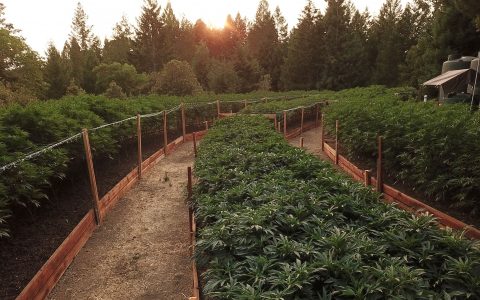Right at the start, the city of Fontana, CA., might have doomed its own effort to enact a harsh ordinance governing the personal cultivation of cannabis.
Just before the city council held its vote in January 2017, city manager Ken Hunt told council members, right out in public, “It is our intent . . . that this ordinance is not a permissive regulation, it is a restrictive regulation.” He added: “By adopting this, you are placing more restrictions on the personal growth of marijuana.”
He might as well have said, “we intend to break state law.”
Tamar Todd, director, office of legal affairs, Drug Policy Alliance
On Nov. 2, state Superior Court Judge David Cohn agreed, striking down most of the ordinance, including its extraordinarily restrictive provisions that included high permit fees and, perhaps most remarkably, a requirement that anyone who wanted to grow cannabis for their personal use must agree to allow city officials inspect their homes.
“I remember that quote [from Hunt]”, says William Freeman, who fought the law in his capacity as senior counsel for the American Civil Liberties Union of California. “It was very clear from the start that they were saying ‘we don’t really care what the voters say.’”
Nor, apparently, did Fontana officials care very much what state legislators say when they pass laws.
The text of Proposition 64, called the Adult Use of Marijuana Act, is clear: Unlike the state of Washington, personal cultivation is allowed, throughout the state. Adults can grow up to six plants in a private residence for personal use. Localities can enact “reasonable” restrictions, but Fontana’s were so unreasonable as to effectively outlaw personal cultivation, Cohn ruled, saying the ordinance went “too far.”
The ordinance required permits, and disallowed them for people who owed the city money in fines and who had a felony conviction for possession of a controlled substance —including cannabis—in the last five years.
Looking For Legal Cannabis? Leafly Has All Your Local Menus
And to get a permit, residents had to agree to allow a city employee inspect their home to determine whether utilities were up to local codes. They also had to pay to have their criminal backgrounds checked through Live Scan—which can cost up to $70—plus pay another $25 for a state review of their records. The state law, AUMA, doesn’t mention any of that.
Then there were the permit fees, which were outlandish. The cost was $411 for the first year, and $253 every succeeding year. Almost needless to say, Fontana has never issued a single permit, which was the point all along.
“They were trying to have a dry city, but that’s not what’s contemplated under state law,” says Joe Rogoway, an attorney who represents clients in the cannabis business. He says that Fontana’s effort, like similar (if less severe) efforts around the state, was a purely “ideological” exercise—the city government is anti-cannabis.
Cities Will Think Twice
It’s unclear what effect the judge’s ruling will have on other efforts by local governments to restrict cannabis, either for private citizens or for businesses. Legally, it likely will have no effect at all, Rogoway says, because the ruling happened in a lower court, so it can’t be used as precedent for any future rulings. It can’t even be cited by lawyers in other cases.
However, it might get at least some local officials to think twice about going too far to thwart the will of both the state government and the majority of Californians, says Tamar Todd, director of the office of legal affairs for the Drug Policy Alliance, which together with the ACLU represented the plaintiff who sued the city of Fontana, Mike Harris, a local resident and longtime medical cannabis patient.
Cohn’s ruling, Todd says, “is a clear indication that localities can’t do what Fontana did, and if they do, they’ll be sued.”
Cities Lag On Legalization
That doesn’t mean the fight is over. Not by a longshot. Thanks largely to restrictive local laws governing permitting, zoning, and other aspects of cannabis, the marijuana business is still absent from about 65% of the state’s localities. Cities and counties have proven to be the weak link in implementing reform.
Mainly, this takes the form of cities and counties simply refusing to issue commercial permits, which they are allowed to do under AUMA. Sometimes, it takes the form of local governments, perhaps trying to have it both ways, technically allowing cannabis businesses to set up shop while also enacting ordinances making it difficult for them to do so.
And finally, there are the cities that, like Fontana, are trying their best to circumvent AUMA’s explicit provisions allowing personal cultivation—for example, by requiring permits (even if not for such high fees). Hundreds of cities have banned outdoor cultivation altogether. The ACLU’s position, says Freeman, is that “there shouldn’t be any application or permit process at all.” AUMA simply says it’s legal to grow up to six plants, he notes, and anything localities do to restrict that right goes against the intent of the law.
Joe Rogoway, attorney, California
Fontana had argued that it was within its rights to enact such heavy restrictions because cannabis is still a felony under federal law. Cohn dispensed with that argument by citing California’s rules governing state-local legal interaction: essentially, local governments can’t do anything that thwarts state law. “It was a non-sensical argument,” Rogoway says. “Cities can’t enforce federal law. They are not an arm of the federal government.”
It’s not clear what might happen next. Fontana officials declined to comment. They might “tinker” with the ordinance to make it as strong as possible, Rogoway says, but it’s unlikely they’ll enact anything like the ordinance that was struck down. Legally speaking, that will affect only Fontana. What will happen in the rest of the state remains to be seen.
Todd, of the Drug Policy Alliance, says it will likely take a while before the state reaches a tipping point, and most localities are fully on board with legal cannabis, and the business can really thrive.
“People say, ‘Oh, we’re ten months in and it’s not working,’” she says. “But legalization requires a long transition time.”
How long? “At least ten years,” she says.
How are home-grow rules where you live? Comment below!














